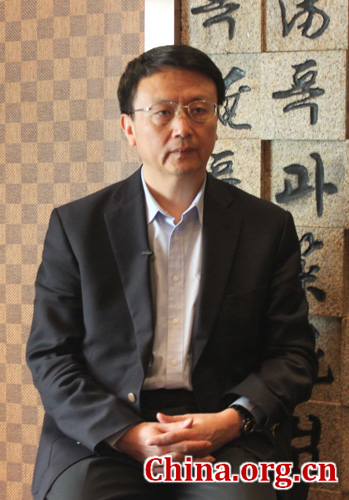Jia Qingguo: Sino-DPRK ties depend on the latter
- By Wang Wei
 0 Comment(s)
0 Comment(s) Print
Print E-mail China.org.cn, March 8, 2013
E-mail China.org.cn, March 8, 2013
China fully expects to maintain peaceful relations with the DPRK, but Beijing's attitude towards North Korea depends on what actions Pyongyang decides to make, says Jia Qingguo, a CPPCC member and associate dean at Peking University's School of International Studies.
|
|
?? |
|
Jia Qingguo, member of the 12th National Committee of the Chinese People's Political Consultative Conference (CPPCC) and associate dean of the School of International Studies of Peking University [Wang Wei/China.org.cn] |
Jia emphasized that China has been consistent in its policy towards the DPRK nuclear issue. "We have three aims: urging the DPRK to abandon its nuclear weapons program, that is, the denuclearization of the Korean Peninsula, ensuring peace, and solving issues through dialogue," he says.
"China's policy would be very favorable for the DPRK if its actions were proper; however, if not, China would have to take sides with the international community to impose sanctions against the DPRK developing nuclear weapons," he adds.
Meanwhile, the DPRK supreme military command announced on Tuesday that the North would nullify the Korean War Armistice Agreement beginning March 11, the same day that South Korea and the United States plan to stage a joint military drill. The DPRK has also announced a cancellation of future Panmunjom delegations, the venue where the DPRK and South Korean officials usually meet for communication and negotiations.
"Such announcements from the DPRK are possibly attributed to its domestic policy. The country expects these actions can win more support from its people; however, they leave a worse impression on the international community and pose security threats against the country," Jia says.
The United Nations Security Council unanimously passed a new resolution imposing new sanctions on North Korea March 7 for its prohibited nuclear test last month.
Jia pointed out that the Korean War Armistice Agreement is actually one protecting the DPRK and its abolishment would do nothing good for the country. The DPRK has been striving to improve DPRK-U.S. relations, but its actions make that difficult to achieve.
Future DPRK-U.S. ties will depend on whether the North will stand by its original commitment to abandon its nuclear weapons program, whether it would make reforms and open up towards the outside world, and whether it would carry out policies more similar to the world's trends, Jia added.






